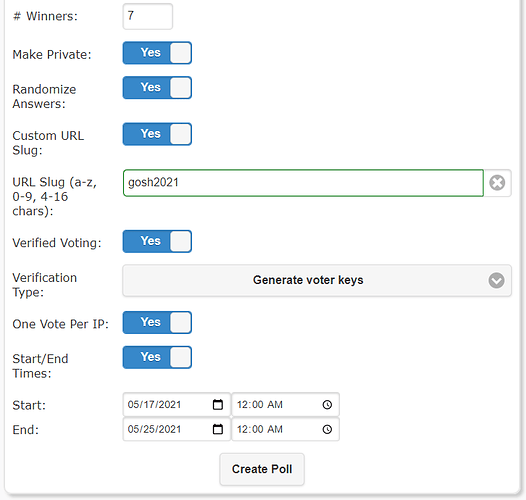Alright, I’ve been in touch with the STAR people over the past week with about a dozen back-and-forth emails. They have been very responsive and answered my various questions quickly and patiently. Short answer first:
YES, email-based “one email one vote” ballots can be achieved with https://star.vote
Here’s the longer answer regarding holding an election using STAR-voting on https://star.vote:
- The election administrator can generate a list of unique “voter keys” (they look like this:
08d30d705a7258d7). Each key can then be sent to each registered voter’s email. Here’s an example screenshot:
- The voter visits the election URL, enters their voter key, and cast their ballot by scoring as many candidates as they want. Once this is done, the voter key is deactivated and cannot be used again.
- Once the ballot is cast, the voter will receive a “voter ID” that they can keep as a reference and verification that their vote has been successfully cast and counted. The administrator will not know the link between voter key and voter ID, so the votes are anonymous.
Bonus points:
- The order of candidates on the ballot can optionally be randomised for each voter to reduce bias. I.e. the order of options that each voter sees is different.
- Multi-winner elections are supported using the STAR Multi-winner Bloc method. Basically, the 1st place winner is elected, then the process is repeated for the remaining candidates until the desired number of winners are chosen. So for GOSH we can set the number of winners to 7. By the way, regardless of method the website will tell you the ordering of the winners from first to last place anyway, so we can use that list to ensure the 4 reserved seats are filled correctly.
- If for some reason we really have trouble managing the unique voter keys and sending them to registered users, we can optionally just send a list of emails to them and they can help distribute the voter keys.
I asked about the sustainability and future plans for STAR and the https://star.vote platform. It is fully open source and:
- They have received a surge in support and interest over the past year (presumably because of the US elections…) so I think this platform should be reliable for the forseeable future. They even invited me to their developer chat channel to see what the process looks like.
- Easier email-based ballots is a “top priority” for the developers, and it is very likely that distributing unique voter IDs/links to registered voters via email will be even easier in the future.
With this information, I think using STAR (as implemented by https://star.vote/) is a fully viable option for the upcoming GOSH Community Council election. It is valuable that we now have a direct line of communication to the organisation and developers behind STAR who have been very responsive and expressed a desire to support us through the whole process. They are also keen to get our feedback if we choose to use STAR. (to be clear, maybe the developers behind CIVS will be responsive, too, but I admit I haven’t tried to contact them yet  )
)
But just to sum up previous posts and what I’ve learned, a few possible downsides:
- STAR often selects the Condorcet winner (if it exists), but this is not guaranteed. Regardless, the voting results page will show a table of the pairwise comparisons. But as mentioned in previous posts, it is difficult to find an election method that perfectly ticks all the boxes.
- For now, we need an account on the STAR-voting website to create elections with unique voter keys. The people behind STAR has offered to create an account for us. Apparently this is another development priority that will be made easier in the future.
- The STAR voting platform is newer than CIVS. Normally I would be concerned, but given my communications with the team, their enthusiasm, and the huge growth of their organisation I think we should be OK.
- To my knowledge (correct me if I’m wrong!): STAR has been used in a few real-life elections on the local level but a Condorcet method with Minmax-PM has not. On the other hand, the Condorcet method with Minmax-PM as done by CIVS has been used for big open source communities like Debian but STAR has not (we will be the first one?). Either way, both has been used successfully without major controversy.
This is all I can remember and summarise for now. If I have to pick one I’m still inclined towards STAR especially with the support we can get from them, but of course I appreciate your feedback and respect the decision of the Governance Working Group. If you have more questions I’m happy to pass them to the developers, or I can give you their contact information. Thanks!
